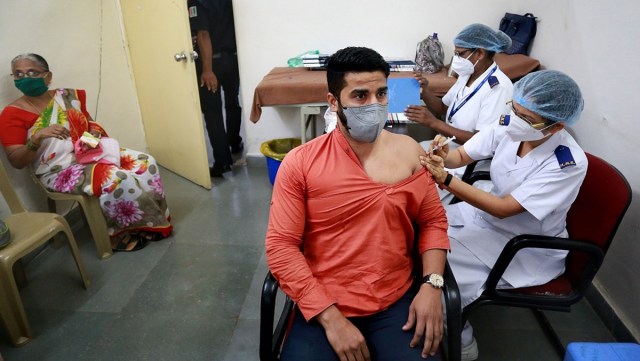And moving to tide over vaccine registration problems as it expands the inoculation drive, especially in the semi-urban and rural areas, the Centre, in revised guidelines issued to the states Tuesday, said that the option of on-site registration must be available at government as well as private vaccination centres. This facility will be available for individuals and groups. The detailed procedure is to be finalised and published by states to minimise any inconvenience to citizens.

Dr V K Paul, head of India’s Covid-19 task force, said: “On-site registration and the registration of groups will become very important as we move to the periphery and semi-urban areas. We have to help register large groups on-site. Common services centres and call centres will also be used for prior booking.
He said the Ministry of Health has placed orders for 25 crore doses of Covishield from Serum Institute of India and 19 crore doses of Covaxin from Bharat Biotech, and that 30 per cent advance amount has been released to the two vaccine manufacturers.
Detailing the blueprint for augmentation of vaccine supplies post-August, Paul said India will have 74 crore additional doses available from August, including the recent order for 30 crore doses from Biological E.
“Up to July, we have an availability of 53.6 crore doses; these orders were placed earlier (during different phases of vaccination). Going ahead, 74 crore more doses have been secured and we do not see a shortage in August-September.”
“In fact, we will have to increase our vaccination pace to absorb the availability of doses. The big picture is clear. These doses are to be delivered from August and December… there may be others to be placed. Timelines are available, we have told them (manufacturers) to provide a road map and availability schedule,” he said.
Story continues below this ad
ExplainedKey to shots for all
On-site registration is critical to expanding vaccination, especially beyond urban centres. This was also underlined by the Supreme Court which asked the government if mandatory registration on CoWIN was practical given the digital divide in the country.
Asked if the decision on centralised procurement of vaccines by the Centre was based on observations made by the Supreme Court, Paul said: “The honourable Supreme Court issued directions. We respect the guidance and concern expressed by the honourable Supreme Court. However, the Government of India was evaluating the implementation of decentralised (procurement) ever since it was conceived and ever since it was implemented; different teams were keeping a watch on the difficulties. There was a public narrative, to which we were also aligned. Such decisions are taken over a period of time, based on analysis, feedback, experience and consultation with various stakeholders… It is the totality of the picture, and of course, the public narrative which is very important.”
He said 12 states specifically requested a return to centralised procurement and implementation of the vaccination programme in a concerted way. These were Maharashtra, Punjab, Kerala, Rajasthan, Jharkhand, Odisha, Andhra Pradesh, Arunachal Pradesh, Tripura, Mizoram, Meghalaya, Sikkim and Andaman & Nicobar Islands.
Based on the request, Paul said, reviews were taken at the highest level on May 15 and May 21. “On the basis of the review, the Prime Minister directed the Health Ministry to take action on the changes that would be required to take this policy initiative (of vaccination) forward,” he said.
“After the direction by the PM, teams got feedback from manufactures, spoke to the states in a systematic way to see what is the best way forward. We also looked at practices across the globe. The teams tried to understand the difficulties being faced (by states on procurement)… based on this, we thought we have to go back to centralised procurement.”
Story continues below this ad
Paul said that health care workers, frontline workers, those above the age of 45, and those whose second dose is due, will get priority in vaccination when the Centre takes over procurement from states from June 21.
“Vaccination of the health care workers and front line workers will continue to get the highest priority; specifically, their second is a priority. Clearly, citizens more than 45 years of age are a priority. We have highlighted that overwhelming mortality occurs in this age group, and if we address the immunisation of this group, we are able to knock off mortality in a very big way, which is over 80 per cent. Those citizens whose second dose has become due are clearly a priority… Within the 18-44 age group, the state will have the flexibility to decide their own prioritisation,” Paul said.









